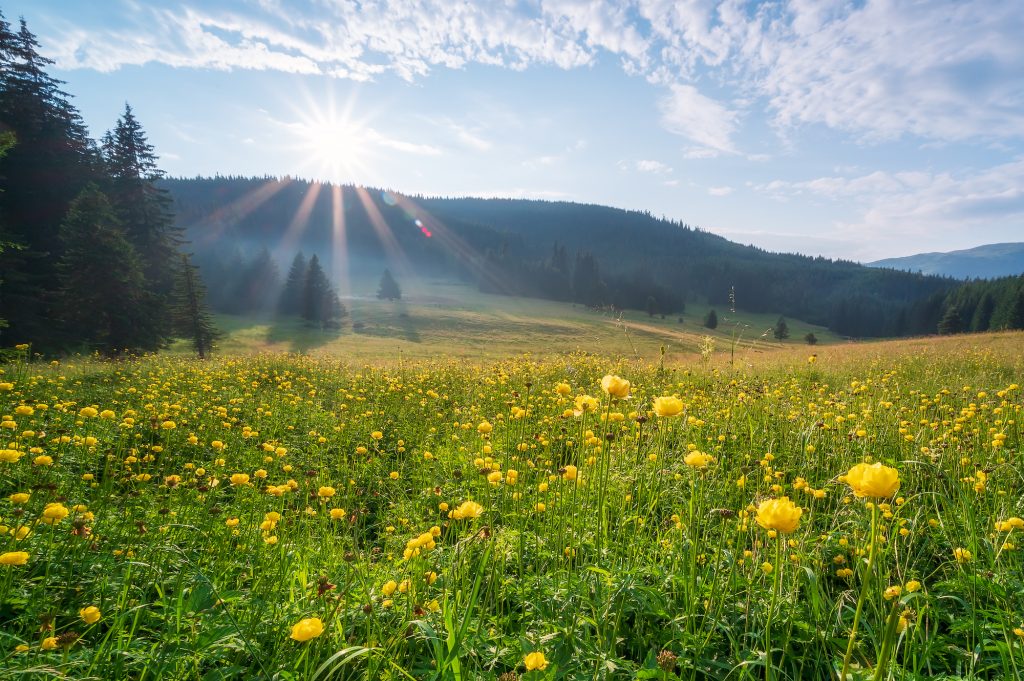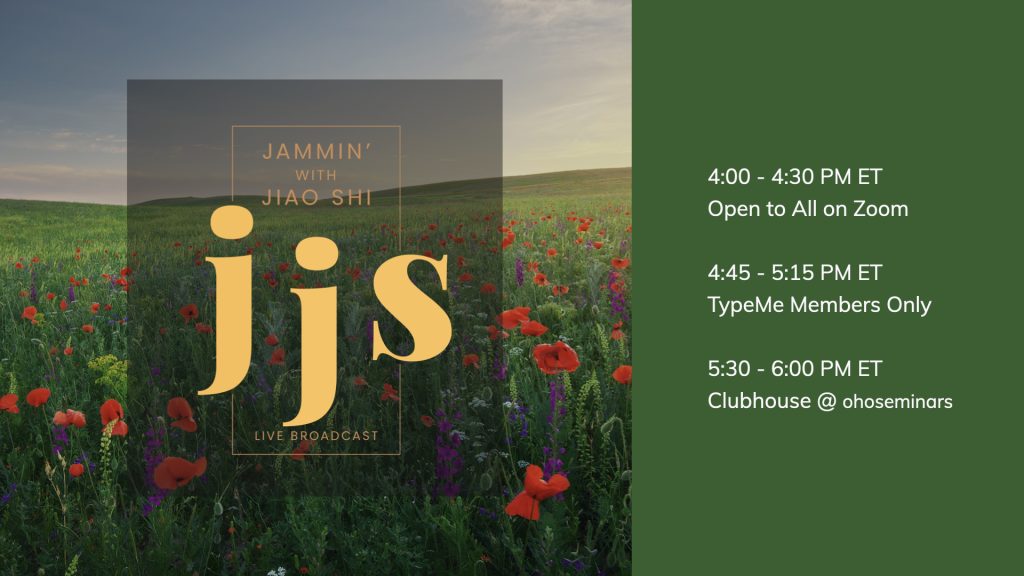Gǔ Yǔ: Grain Rain
谷雨 Gu Yu: Grain Rain
April 19th through May 4th marks the time of谷雨 Gu Yu, or Grain Rain, the 6th term in the Ancient Chinese solar calendar. It is also the last solar term of the spring season. 谷雨 Gu Yu begins when the Sun reaches the celestial longitude of 30° and ends when it reaches the longitude of 45°.
Grain Rain Legend
仓颉 Cāngjié, a legendary figure of ancient China who lived approximately 4,000 years ago was the official historian of 黃帝 Huangdi, the Yellow Emperor, and the creator of Chinese characters. Legend has it that when 仓颉 Cāngjié created the first Chinese character, angelic deities exclaimed in adoration and rained millet onto people from the heavens.
“Rain brings up the growth of hundreds of grains.” – Ancient Chinese Proverb
The 3 pentads of 谷雨 Gu Yu are:
1st pentad – 獺祭魚 duckweed begins to sprout
2nd pentad – 鴻雁來 cuckoo shakes off wings.
3rd pentad – 草木萌動 hoopoe perches in mulberry trees.
Grain Rain marks the end of snow and frost in the Northern Hemisphere. Outside temperatures begin rising rapidly in Northern China and rain falls in abundance. It is a peak time for planting corn and rice. Crops grow fast and strong during this solar term. While farmers are busy protecting their crops from pests during 谷雨 Gu Yu, people in China exercise prevention and boost their immune systems.
香椿 Xiāng Chūn (Toona Sinensis)
Harvesting and cooking 香椿 Xiāng Chūn, commonly known as Chinese mahogany and Chinese cedar, is a famous tradition in Northern China during Grain Rain. It is a joyous affair in which friends and family come together.
“Toona Sinensis before the rain is as tender as silk.” -Ancient Chinese Proverb
The 谷雨 Gu Yu, or Grain Rain solar term is also significant to fishing communities in the coastal areas of Northern China. Fishermen celebrate the arrival of Grain Rain at a 2,000 year old 谷雨 Gu Yu Festival. It marks the first time in the annual cycle when fishermen can safely return to sea and resume their fishing voyages.
牡丹 Mǔ Dān (Peony Flower) & 谷雨 Gu Yu: Grain Rain

谷雨 Gu Yu is the time of year when the flower of Guyu or peony (牡丹 mǔ dān) comes into full bloom, attracting spectators from far and wide. Peony is the “king of flowers” in China. Its design was often sewn into imperial clothes, it adorned imperial gardens, and it continues to be widely represented in art projects. Chinese people believe that this unique flower can enrich a person’s life as many times as each blossom has petals. Since time immemorial this flower has been a symbol of wealth and prosperity in Chinese culture.
“Moss covered paths between scarlet peonies Pale jade mountains fill your rustic windows I envy you, drunk with flowers Butterflies swirling in your dreams.” -Chinese poet 钱起Qian Qi, 唐朝Tang Dynasty (618 – 907)
“Springtime radiance, gradually, gradually where does it go Again before a wine jar, we take up a goblet All day we’ve questioned the flowers, but the flowers do not speak For whom do they shed their petals and leaves, for whom do they bloom -Peonies at Jixing Temple by隋煬帝 Emperor Yang of the 隋朝 Sui Dynasty (581-618)
Peony fairs are traditional popular events which attract countless spectators who come to appreciate the splendor of the blooming gorgeous peony flowers. Beauty and elegance are not the only characteristics this flower is famous for. The peony plant has valuable medicinal properties and has been used in Traditional Chinese Medicine for thousands of years. Read more about the Legend of Peony and Chinese Physician Hua Tuo here.
The Beautiful Ancient Tradition of Gu Yu Tea
Another beautiful ancient Chinese custom is drinking Guyu tea. In ancient China scholars, painters, philosophers, poets and other intellectuals traditionally gathered on the first day of 谷雨 Gu Yu to drink Guyu tea and hold discussions.
“It is a sunny day, neither windy nor rainy Green bamboo grows robustly and stands gracefully A pot of songluo [the finest guyu] tea is prepared and friends arrive in the cool evening I draw several lines on paper and new bamboo leaves and far mountains are portrayed How nice it is that Gu Yu follows right after Tomb-sweeping Day We sit together with our tea on the table” -by calligrapher and painter 鄭板橋\郑板桥 Zheng Banqiao (1693–1765), 大清 Qing Dynasty (1636 – 1912)
Guyu tea is highly prized and rare. It is not available for sale and is harvested locally in small quantities – just enough for family members, friends and honored guests only.
Drink guyu tea to become fearless. – Ancient Chinese Proverb
Authentic guyu tea contains tea leaves hand picked early in the morning, starting at 5 a.m. on the first day of Grain Rain. Guyu tea should only have one sprout and one or two tender leaves. The harvesting should be complete by noon of that day. The tea leaves are then processed using a unique traditional technique of frying, drying and folding the tea leaves by hand and are ready by evening. When the time-honored process is complete, close friends, family members and honored guests gather to brew and enjoy guyu tea together that same day while welcoming this sixth solar term.
谷雨 Gu Yu: The Last Spring Term
Being the last solar term of the spring season 谷雨 Gu Yu, has another important role which is preparing everyone for a smooth transition from spring into summer.
Grass and trees know how soon spring will bid goodbye. A hundred shades of reds and violets will vie for beauty crown. –Ancient Chinese Proverb
May you continue to balance and harmonize yourself as we transition into 谷雨 Gu Yu. Remember to enjoy the journey!
“The first cup caresses my dry lips and throat The second shatters the walls of my lonely sadness The third searches the dry rivulets of my soul to find the series of five thousand scrolls With the fourth the pain of past injustice vanishes through my pores The fifth purifies my flesh and bone With the sixth I am in touch with the immortals The seventh gives such pleasure I can hardly bear The fresh wind blows through my wings As I make my way to Penglai [the mountain of the immortals]” -The Song of Tea by卢仝Lú Tóng (790-835), Tang Dynasty (618 – 907)
Don’t forget to check out the newest videos on our YouTube Channel
Jammin’ With Jiao Shi


